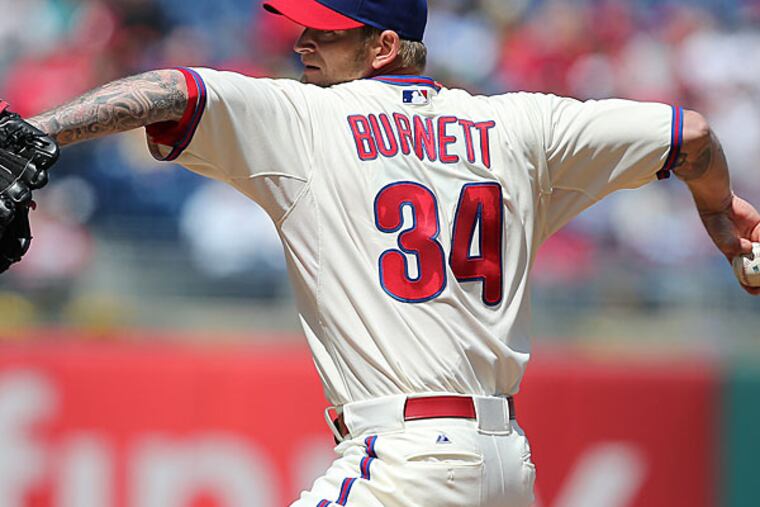Phillies' Burnett may be getting a lift from hernia
The righthander A.J. Burnett said his inquinal hernia may be helping his control by preventing him from lengthening his stride.

THE ONLY MOMENTS when A.J. Burnett appeared limited by his hernia occurred on the base paths. One was in the third inning, another in the sixth, both occasions featuring a gait that suggested soiled trousers. An inguinal hernia is not a pleasant thing, but in a 1-0 win over the Braves yesterday, it did not appear to hamper Burnett where he most matters.
In fact, the 37-year-old righthander revealed after the game, the injury may have even helped him by preventing him from lengthening his stride during his delivery, a problem that at times affects his control.
"It's going to be a blessing in disguise, I think," Burnett said. "It's always going to be there, but it helps me to stay within myself. A couple of pitches, when I tried to do too much, I could tell it wasn't right, but every time I was simple and just nice and easy, I was able to make the pitches."
Performances such as yesterday's were the reason the Phillies decided to give Burnett a contract that will pay him at least $16 million this season, and could end up paying him almost as much next season. He allowed just five baserunners, striking out five, recording 13 outs on the ground and just one through the air.
His only trouble came in the third inning, when he coaxed Freddie Freeman into an inning-ending groundout with runners on the corners. From that point on, he retired 10 of 11 hitters, the lone exception coming on a two-out Freeman single in the sixth.
"I've pitched with worse; it's just one of those things I have to stay on top of and really focus on my delivery," said Burnett, who lowered his ERA to 2.74. "And that was the case today, one pitch at a time, just get on that rubber and try to stay within myself and not overdo it."
Talkin' 'bout velo
Jonathan Papelbon doesn't want to hear anymore about his velocity. The onetime flamethrower has seen his fastball drop from the mid-90s to the low 90s over the past few years, but he doesn't understand the hullabaloo.
"Why do you guys care about velo so much, man?" Papelbon asked the media. "Is that - does that matter? You think that matters? I don't understand that. I mean, if a ball has life at the plate and you are throwing 88 miles an hour as opposed to 98 miles an hour, it doesn't make one damn bit of difference. Whether you throw 93 or 94 or 84. I just, I don't get it, man.
"You all killed Roy [Halladay] about velo. It's not a big deal. If you do your job and the ball is coming out of your hand, it doesn't matter how hard you are throwing. Their pitcher over there - what was he throwing, high 80s, low 90s? How well did he pitch? He ran through our lineup for the first eight innings basically. But it had life at the plate. That's all that really matters, man. End of story."
Papelbon has a bit of a point, but the focus on velocity isn't an implication of velocity's importance. Rather, velocity is one of the few measurable baselines that observers can use to compare a pitcher with how he usually is. And while a change in velocity might not become a culprit, whatever is causing it could end up becoming one. As was the case with Halladay, who retired not long after concerns were raised about his velocity.
Howard comes off bench
With two outs in the eighth and the score 0-0, Ryne Sandberg elected to pinch-hit Ryan Howard against lefty Travis Wood rather than going with either of his righthanded options on the bench, switch-hitting utility man Freddy Galvis and Carlos Ruiz, who had the day off from catching. Managers are often hesitant to use their backup catchers as pinch-hitters to save them for potential fill-in duty should an injury occur behind the plate.
While Howard has struggled against lefties throughout his career, his numbers are actually better than those of Galvis, who has a career .215 batting average, .261 on-base percentage and .346 slugging percentage with 60 strikeouts in 289 at-bats against lefties. Howard is 3-for-17 with a home run, a double and eight strikeouts against lefties this season. In his career, he is a .224/.300/.428 hitter against them, although he has been a lot worse over the last four seasons, including his last full healthy season in 2011, when he hit .224/.286/.347 with 55 strikeouts in 170 at-bats against lefties.
Howard ended up drawing a walk that turned over the lineup, bringing Ben Revere to the plate for what turned out to be a go-ahead RBI single that knocked in Domonic Brown from second.
"That was a big at-bat that got the winning base hit up to home plate," Sandberg said. "Once again, he laid off pitches, he didn't go out of the zone and force anything. He took his walk, which gets us to the top of the order."
Howard was not in the starting lineup, replaced by the righthanded-hitting John Mayberry Jr. Howard entered the day hitting .231 with a .344 on-base percentage and .442 slugging percentage, with three home runs, two doubles, 19 strikeouts and nine walks in 61 plate appearances.
Phillers
Righthander Jonathan Papelbon's velocity, a concern since spring training, showed noticeable improvement, an observation that Ryne Sandberg pointed out in his postgame news conference . . . Chase Utley went 2-for-3 and is hitting .462 . . . Attendance: 25,750.